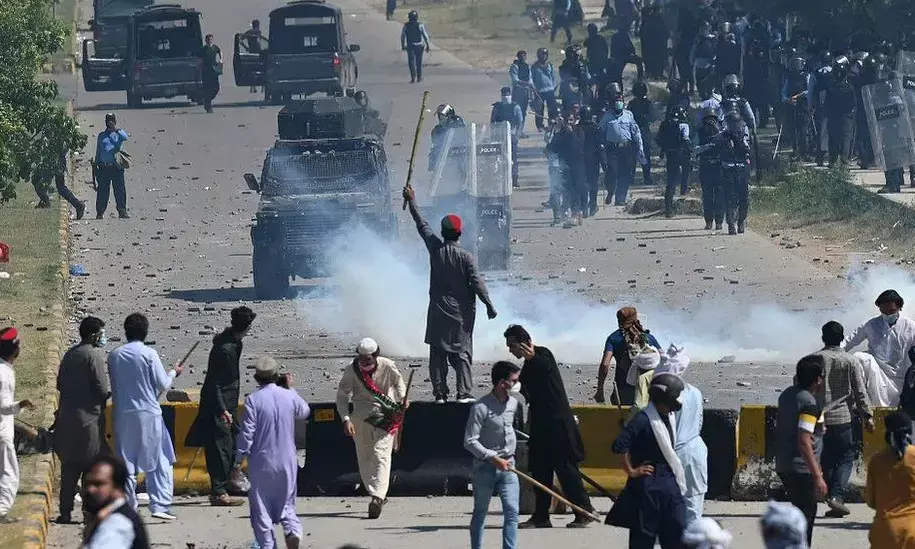Why Are Pakistanis Attacking Their Own Army?
Economic downslide and growing frustration

Major cities and townships in Pakistan witnessed spontaneous violent protests by workers and supporters of Pakistan Tehreek-e-Insaaf (PTI), as they poured out on the streets against the arrest of former prime minister Imran Khan on May 9. The protesters broke into and vandalised the unoccupied, but guarded, official residence of Corps Commander Lahore before setting it ablaze.
The anger against the army was so strong that one of the women, who was carrying away valuable items from the place, justified the same by saying that the same were purchased from hard earned money of the people. The protesters also broke into the premises of General Headquarters in Rawalpindi, the real seat of power in Pakistan.
Setting ablaze military installations, stone pelting on the army and anti-army sloganeering is unprecedented and unheard of in Pakistan. These are the same people of Pakistan, who, in the past, being sick of corrupt politicians, used to welcome army takeovers. It is a different matter that their enthusiasm has always been short lived, as every military ruler, once firmly saddled, had prolonged his stay.
Imran Khan’s arrest came a day after Pakistan army’s media wing, Inter-services Public Relations, warned the former against repeatedly levelling “highly irresponsible and baseless allegation” against a serving military officer. Khan has been accusing Major General Faisal Naseer of Inter-Services Intelligence (ISI), whom he keeps calling “dirty harry”, of plotting to assassinate him.
Khan has been successful in creating a perception that the same ISI officer was behind the failed assassination attempt on him by a suspected “lone wolf” in November last year.
Ignoring the warning, Imran Khan continued his allegations in public domain thereby crossing the “red line” drawn by the army. The warrant issued against Imran by National Accountability of Pakistan for a case of corrupt land deal involving a property tycoon came handy to initiate his arrest by Pak Rangers, who operate under the army.
This might have been just the trigger, but the real reasons for public anger against the army reflect the growing frustration of the masses at the continuous economic downslide.
People blame the Pakistan army for keeping an incompetent and “corrupt” Shehbaz government in power that has failed in controlling the unprecedented back breaking inflation.
Everyone in Pakistan knows that without the backing of the army it would not have been possible for the Pakistan Democratic Movement led by Shehbaz Sharif to topple the government of Imran Khan in the first place. People’s memory is so short that they have completely forgotten that the beginning of the economic morass took place during Imran’s government. However, it has now reached monstrous proportions.
Besides, the people are also angry against the ruling government and its army backers for their failure to hold early elections, as demanded by Imran, thereby denying them their democratic right to re-elect him. The Shehbaz government has refused even to implement the decision of the Pakistan Supreme Court for holding elections to Punjab assembly on May 14. It is generally believed that general elections, as and when held, are likely to bring Imran Khan and his party PTI back in power.
Despite being born and brought up in the nurseries of Rawalpindi (army headquarters) and Aapbara (ISI headquarter), Imran has now trained his guns against his past benefactors. He had tried for some time to negotiate with the army, but on his own terms. That was not acceptable to the army.
He launched a tirade against the army when the relations broke down irretrievably. Thereafter, Imran assiduously and painstakingly weaved a successful narrative through numerous social media accounts against the Pakistan army and how it was keeping a corrupt government in power. All efforts by the army to neutralise the onslaught have been unsuccessful.
In fact, Imran Khan has been on offensive against the leaders of the ruling coalition soon after his removal. His threat, before being thrown out of power, that he will become more dangerous, if he was removed as prime minister, has proven to be prophetic.
Now that Imran Khan has crossed the army's “red line”, the army will lose face if it can’t now keep Imran Khan in jail for some good time or get him disqualified through a judicial process.
Political instability, people on the streets, inability of the law enforcement agencies to implement the rule of law and the failure of the army to protect its assets are fraught with serious consequences for Pakistan and the region. The space in the polity vacated by traditional political parties would be soon open to the religious groups, who have the required manpower and organisation to claim the same.
The countries in the region and the world at large should remember that religious extremist groups in Pakistan have been buoyant after the Taliban took over Afghanistan defeating the most powerful nation on the planet. These groups want the same to be repeated in Pakistan. Tehreek-e-Taliban Pakistan has already made it clear that, for now, the group wants to bring rule of “shariah” in erstwhile tribal areas.
Those in India celebrating the happenings in Pakistan don’t realise that these extremist organisations have a tremendous capacity to generate anti-India sentiments. They can exploit the large pool of cannon fodder available in Pakistan that could adversely affect our security.
The international community should view seriously the developments in Pakistan for stabilising the situation there keeping in mind that it was a country having nuclear weapons.
Avinash Mohananey is former Director General of Police of Sikkim. Views expressed here are the writer’s own.



